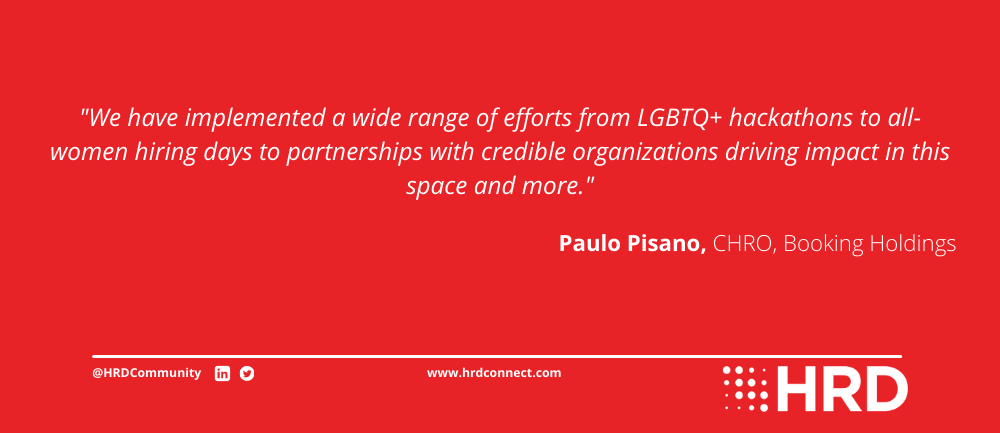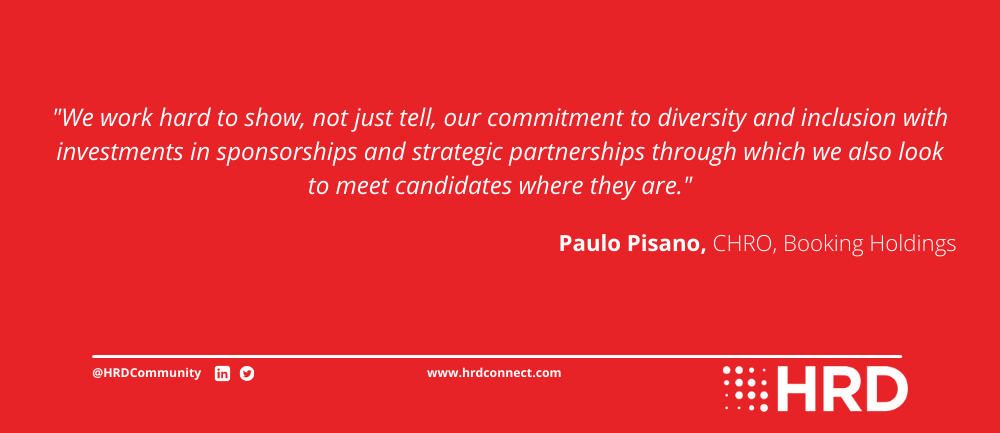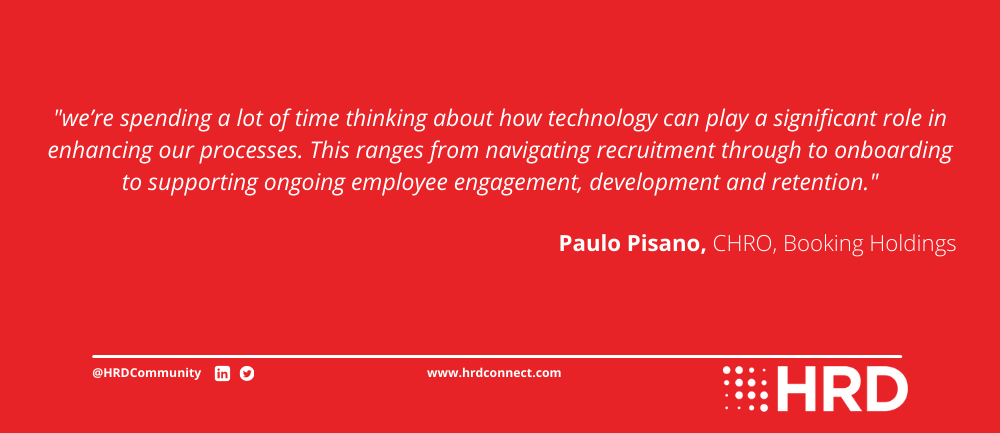-
Provided by

- Date published: Apr 24, 2023
- Categories
As the Chief Human Resources Officer of Booking Holdings, Paulo Pisano understands the importance of a strong technology talent attraction and retention strategy. But amidst ongoing issues with diversity in technology, how does Booking Holdings ensure that they are attracting a diverse pool of candidates for their tech positions?
In this exclusive Q&A case study with HRD Connect, Pisano shares the company’s commitment to diversity and inclusion, as well as the strategies they have implemented to overcome unconscious biases in the hiring process. From all-women hiring days to bias mitigating interview and selection practices, Pisano shares insights into how Booking Holdings is continuously evolving its recruitment strategies to create a more efficient and rewarding experience for both candidates and hiring managers.

What is the philosophy behind your approach to technology talent attraction and retention at Booking Holdings?
Paulo Pisano: At the heart of our approach is our commitment to creating a diverse and welcoming workplace experience that enables everyone to do their best and most creative work. We have an exciting mission – to make it easier for everyone to experience the world – which is not a small task, and we look to attract and retain the world’s best talent to help us achieve this mission. At Booking Holdings and our brands, we believe that the diversity of our people doesn’t just create an inclusive workplace, it also creates a better and more inclusive travel experience for everyone using our products. In line with this, equitable recruiting and hiring practices as well as ensuring opportunities for continuous learning and career development across all roles and levels are critical for building the strong foundation that is essential to drive impact and inspire ongoing innovation, collaboration and growth.
What steps are you taking to ensure that you are attracting a diverse pool of candidates for tech positions?
Paulo Pisano: As one of the world’s leading providers of online travel and related services, we are always looking at how we can attract and hire diverse technology talent. To date, we have implemented a wide range of efforts from LGBTQ+ hackathons to all-women hiring days to partnerships with credible organizations driving impact in this space and more.
We also have invested in bias-mitigating interview and selection practices, and technology-driven solutions to ensure our job descriptions and industry appeals to a diverse pool of candidates. I’m particularly proud of the importance we place on creating an environment where people want to contribute and work toward a shared mission including through developing programs internally to build technology talent from within, with plenty of learning and upskilling opportunities, which we know is hugely valued by prospective and current employees.

How is Booking Holdings communicating its commitment to diversity and inclusion to potential technology talent?
Paulo Pisano: Communicating our commitment to diversity and inclusion to both current and prospective technology talent, and ensuring this shines through in everything we say and do, is just as key as implementing the steps to hire and retain that talent.
We communicate often with talent about our values, which are grounded in the importance of understanding and valuing the contributions of others. We view one of the most critical stages of our interview process as understanding if a candidate aligns with those values. One way we do this is by asking open questions that help us know if the candidate’s values, behavior, and way of thinking match our core company values.
Moreover, we work hard to show, not just tell, our commitment to diversity and inclusion with investments in sponsorships and strategic partnerships through which we also look to meet candidates where they are. Booking.com, for example, has been a key sponsor of the EU WiT conference in addition to its key strategic partnership with MyGWork and a network of institutions that support gender equity in the workplace.
What strategies have you used to overcome biases in the hiring process and ensure that all candidates are evaluated fairly?
Paulo Pisano: Overcoming bias in recruitment has been a challenge for businesses of all sizes in every corner of the globe. I am pleased with the progress that has been made in recent years to ensure the candidate experience is more fair and equitable.
We’ve invested in bias-mitigating interviewing and selection practices including automation, structured interviewing, and structured evaluation, all of which are important to help reach a larger and more diverse technology talent pool.
Moreover, our hiring managers receive training on unconscious bias, and we are taking additional measures to mitigate bias across the interview process by partnering with experts to rework our job descriptions and optimizing the language to be more inclusive.

What impact have your tech-driven recruitment strategies had on your talent pool?
Paulo Pisano: As a technology company, we care about our end-to-end candidate and employee experience in the same way we care about our end-to-end customer experience. We’re committed to making the candidate and employee experience equally as simple and enjoyable as the booking process on our platforms, and technology is really at the heart of that. Historically, there have been plenty of software platforms in the HR and recruitment space that are incredibly powerful tools, but not easy to use. So, we’re spending a lot of time thinking about how technology can play a significant role in enhancing our processes. This ranges from navigating recruitment through to onboarding to supporting ongoing employee engagement, development and retention.
Given we’re recruiting in the highly competitive technology talent landscape for many of our open roles, our talent pool is keenly aware of user experience and we believe that ensuring systems and processes are connected to yield a seamless user experience is critical for that audience.
We’re also seeing that creating a more efficient and rewarding experience with our recruitment technology in turn makes the human interaction that candidates have all the richer. As with everything at our companies, we work hard to measure this impact with Glassdoor and other tooling, so regardless of whether a candidate is hired, we are tracking our continued improvement.
As you look further into 2023, what challenges do you see in the HR space, and what opportunities lie ahead?
Paulo Pisano: With the Great Resignation behind us, attrition is no longer the biggest issue HR teams face. Retaining and developing technology talent has grown to be a more pressing challenge than ever before. As a result, creating employee-centered experiences in the workplace has become the name of the game.
We see that managers have an opportunity to play a pivotal role in this. We’re investing in supporting new and experienced leaders to develop and enhance their skills to help them become more effective coaches, empower and support their people and create an inclusive culture where our people can thrive.
In that same vein, we’re very intentionally looking at company cultural behaviors, symbols, and systems to nurture a strong sense of togetherness, with our values manifested throughout everyday work life, from decision-making to innovation. There are also additional structural frameworks that companies can capitalize on to support employee retention. These include creating career development and learning opportunities, leveraging technology to enhance ease of work, ensuring data is used to continually enhance and optimize the employee experience, investing in activities that connect colleagues and the company’s culture, and much more.








